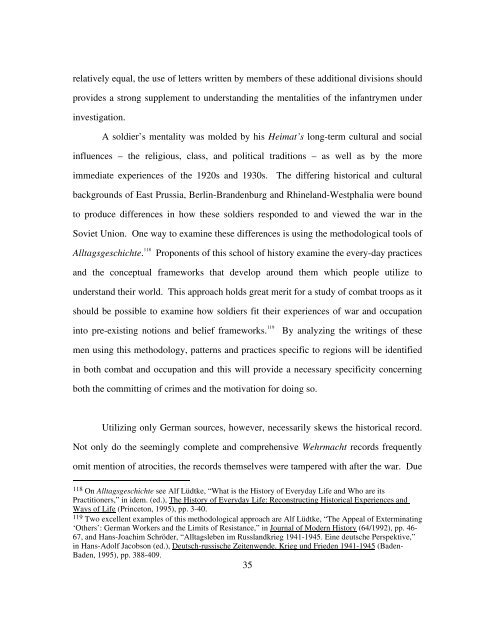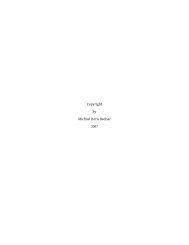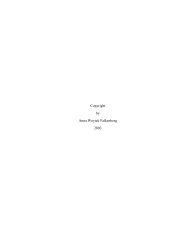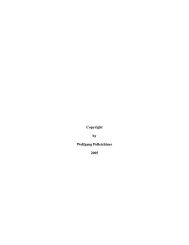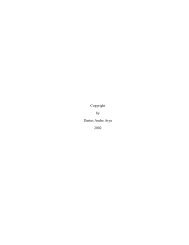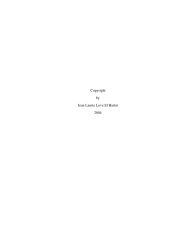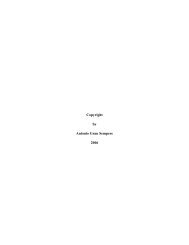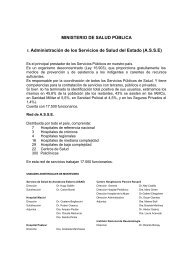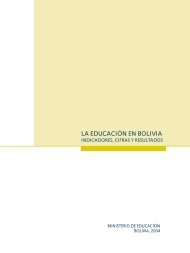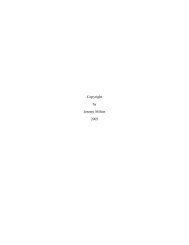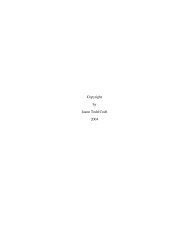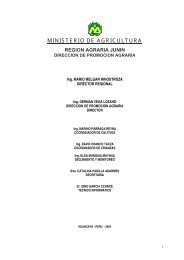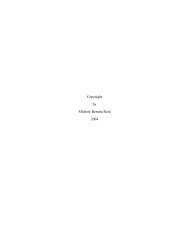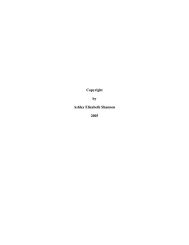- Page 1 and 2: Copyright by Jeffrey C. Rutherford
- Page 3 and 4: Soldiers into Nazis? The German Inf
- Page 5 and 6: Acknowledgements This dissertation
- Page 7 and 8: Soldiers into Nazis? The German Inf
- Page 9 and 10: Table of Contents List of Tables ..
- Page 11 and 12: List of Tables Table 1: Casualties
- Page 13 and 14: List of Illustrations Illustration
- Page 15 and 16: fulfill numerous duties outside of
- Page 17 and 18: Communism [is] an enormous danger f
- Page 19 and 20: “systematic starvation of million
- Page 21 and 22: national-socialist German Volk,”
- Page 23 and 24: German Army had “finally [become]
- Page 25 and 26: Heer, the exhibition claimed that
- Page 27 and 28: the taboo:” the Army’s particip
- Page 29 and 30: seriously implicated in National So
- Page 31 and 32: June 1941, only nine were Security
- Page 33 and 34: official doctrine and kept alive th
- Page 35 and 36: looms large. Fundamentally, this me
- Page 37 and 38: was seen as desirable, either due t
- Page 39 and 40: would have been fought as a particu
- Page 41 and 42: method in looking at the German Arm
- Page 43 and 44: northernmost Army Group have receiv
- Page 45 and 46: which these crimes were committed a
- Page 47: the content of even one letter, to
- Page 51 and 52: indispensable source for investigat
- Page 53 and 54: SECTION ONE: REGIONAL COHESION AND
- Page 55 and 56: a series of wars fought in the Balt
- Page 57 and 58: emaining 40% of the population was
- Page 59 and 60: ecently as May 1928, the NSDAP rece
- Page 61 and 62: As the preceding discussion intimat
- Page 63 and 64: moderate Left following a successfu
- Page 65 and 66: IV. CONCLUSION While the Weimar Rep
- Page 67 and 68: The system ran into major difficult
- Page 69 and 70: The importance of regional homogene
- Page 71 and 72: “equivalent of its initial streng
- Page 73 and 74: alternative existed between the Shi
- Page 75 and 76: In an attempt to gauge the effectiv
- Page 77 and 78: trained reserves. 219 90,000 of the
- Page 79 and 80: Monthly Casualties 3000 2500 2000 1
- Page 81 and 82: Monthly Casualties 3000 2500 2000 1
- Page 83 and 84: to lead offensive operations. 240 T
- Page 85 and 86: Replacements began entering the 126
- Page 87 and 88: Number of Men 140 120 100 80 60 40
- Page 89 and 90: 46% of the troops were native to Mi
- Page 91 and 92: flank such as the 123 rd ID, did ex
- Page 93 and 94: attle for the Volkhov Pocket as 4,8
- Page 95 and 96: A similar rollercoaster pattern als
- Page 97 and 98: Number of Men 180 160 140 120 100 8
- Page 99 and 100:
Number of Men 1600 1400 1200 1000 8
- Page 101 and 102:
An astounding number of over 12,000
- Page 103 and 104:
dilution of the units’ bonds. Reg
- Page 105 and 106:
groups of men constituted only 44%
- Page 107 and 108:
men, since March. 290 From August t
- Page 109 and 110:
Numbers of Men 2500 2000 1500 1000
- Page 111 and 112:
one soldier who had any ties to the
- Page 113 and 114:
a large scale - this is something n
- Page 115 and 116:
Westphalian 254 th ID related a sim
- Page 117 and 118:
of the 1,567 replacements received
- Page 119 and 120:
winter of 1941/1942. This meant tha
- Page 121 and 122:
propaganda has been overstated in e
- Page 123 and 124:
In addition to receiving military i
- Page 125 and 126:
and political commissars were to be
- Page 127 and 128:
Führer against the center of this
- Page 129 and 130:
Army men were quickly changing into
- Page 131 and 132:
with the behavior of the men earlie
- Page 133 and 134:
however, they were well aware of th
- Page 135 and 136:
1; a report sent to II Corps indica
- Page 137 and 138:
fortifications. 388 The medic in th
- Page 139 and 140:
While the German Infantry learned t
- Page 141 and 142:
only a few lean pigs - what will we
- Page 143 and 144:
quotations reveals ideological warr
- Page 145 and 146:
In what seemed to be a universal re
- Page 147 and 148:
measures” in “hopes [of] stop[p
- Page 149 and 150:
as artillery, supply and communicat
- Page 151 and 152:
intensified as the fighting neared
- Page 153 and 154:
marks. 460 Lt. W. was far more scor
- Page 155 and 156:
east of the Leningrad encirclement,
- Page 157 and 158:
however, was limited to the tempora
- Page 159 and 160:
of artillery approximate that of th
- Page 161 and 162:
are near the end of their physical
- Page 163 and 164:
first netted 93 prisoners as well 2
- Page 165 and 166:
“thoroughly positive” attitude
- Page 167 and 168:
operation. 522 The Rhinelanders con
- Page 169 and 170:
in attempts on rear-area connection
- Page 171 and 172:
In comparison to the logistical sit
- Page 173 and 174:
proper winter equipment, reporting
- Page 175 and 176:
While the 123 rd ID struggled to se
- Page 177 and 178:
in the 123 rd ID carried out severa
- Page 179 and 180:
Army were assigned to cooperate wit
- Page 181 and 182:
only limited to defensive combat.
- Page 183 and 184:
positions with the outcome of the b
- Page 185 and 186:
The division ordered the clearing o
- Page 187 and 188:
equired evacuation. The civilians n
- Page 189 and 190:
quartermaster of the 123 rd ID orde
- Page 191 and 192:
villagers, both under threats of vi
- Page 193 and 194:
five months later, Colonel-General
- Page 195 and 196:
Once again, each division had its o
- Page 197 and 198:
Cooperation between the German Army
- Page 199 and 200:
frequently stripped of any possessi
- Page 201 and 202:
126 th and especially the 123 rd ID
- Page 203 and 204:
individual soldiers did circumvent
- Page 205 and 206:
were “undesirable . . . on espion
- Page 207 and 208:
authorities deemed anyone who “su
- Page 209 and 210:
etc., etc.” 692 These degrading m
- Page 211 and 212:
odied males led to a labor shortage
- Page 213 and 214:
Individual soldiers claimed that th
- Page 215 and 216:
direction of Petersburg, to turn ba
- Page 217 and 218:
economic agencies believed that the
- Page 219 and 220:
the troops’ discipline caused by
- Page 221 and 222:
there are in Leningrad increases th
- Page 223 and 224:
The population’s mood in the comb
- Page 225 and 226:
lack of transport capacity limited
- Page 227 and 228:
hanged for cannibalism in February
- Page 229 and 230:
the question of sustenance [for civ
- Page 231 and 232:
Einsatzgruppe A also noted that the
- Page 233 and 234:
the food it could lay its hands on.
- Page 235 and 236:
the exhaustion felt by the 121 st I
- Page 237 and 238:
day of the entire Eastern Campaign,
- Page 239 and 240:
This cracking morale was caused in
- Page 241 and 242:
Volkhov River. 821 The East Prussia
- Page 243 and 244:
possessed little chance of success,
- Page 245 and 246:
worsened daily. No supply, constant
- Page 247 and 248:
on every man through fortification
- Page 249 and 250:
without break. 850 Within two weeks
- Page 251 and 252:
than part of an ideological war aga
- Page 253 and 254:
ehind us is nothing more than furth
- Page 255 and 256:
The 126 th ID informed XXXVIII Corp
- Page 257 and 258:
celebration. 883 According to the 4
- Page 259 and 260:
feelings such as these translated i
- Page 261 and 262:
Secondly, as the latter entry notes
- Page 263 and 264:
foot were able to traverse the corr
- Page 265 and 266:
good spirits, though in individual
- Page 267 and 268:
The Germans began to recruit as wel
- Page 269 and 270:
terrain, which provided partisans w
- Page 271 and 272:
destroy a section of Novgorod-Luga
- Page 273 and 274:
the inside. 956 Troops operating un
- Page 275 and 276:
Since 12.3.42 290 ID Rgts-Staff and
- Page 277 and 278:
Regiment, prepared to meet the resc
- Page 279 and 280:
well as prisoners-of-war for these
- Page 281 and 282:
January as it did not possess the n
- Page 283 and 284:
“emergency measures” in those v
- Page 285 and 286:
ehavior and ruthlessly exploiting t
- Page 287 and 288:
“special meaning . . . due to the
- Page 289 and 290:
the deaths of only two partisans fr
- Page 291 and 292:
Wehrmacht. 1027 The individual sold
- Page 293 and 294:
Chapter 8: “From One Mess to Anot
- Page 295 and 296:
altogether, 27.9.42 was one of the
- Page 297 and 298:
surrounding population. Division co
- Page 299 and 300:
had their passes marked “A” whi
- Page 301 and 302:
were soon washed away as the 121 st
- Page 303 and 304:
The 121 st ID certainly shoulders r
- Page 305 and 306:
ordered Manstein to take command of
- Page 307 and 308:
the Hilfswilligen for voluntary and
- Page 309 and 310:
The 121 st ID also worked closely w
- Page 311 and 312:
the High Command, they do demonstra
- Page 313 and 314:
SECTION FOUR: RETREAT - SCORCHED EA
- Page 315 and 316:
etreat, participating in what perha
- Page 317 and 318:
Soviet pressure on the southern fro
- Page 319 and 320:
and successful combat.” 1128 The
- Page 321 and 322:
and seizure of all men ages 16-65 w
- Page 323 and 324:
the Demiansk pocket thought to be r
- Page 325 and 326:
Chapter 10: “War and fire . . . t
- Page 327 and 328:
was bought at a steep price. The 12
- Page 329 and 330:
superior at Corps that the division
- Page 331 and 332:
Division to ship its Jagd-Kommando
- Page 333 and 334:
eported the shooting of six partisa
- Page 335 and 336:
indicate that it suffered relativel
- Page 337 and 338:
were only allowed enough “food ne
- Page 339 and 340:
thirty-five villages. 1233 While a
- Page 341 and 342:
we don’t have it easy out here [a
- Page 343 and 344:
In addition to the implementation o
- Page 345 and 346:
troops through a mixture of militar
- Page 347 and 348:
were to compile lists of inhabitant
- Page 349 and 350:
Corps informed the 126 th ID that i
- Page 351 and 352:
problem. 1292 In the monthly report
- Page 353 and 354:
126 th ID’s commander commented o
- Page 355 and 356:
Improper treatment, inadequate care
- Page 357 and 358:
supplies from both the civilian col
- Page 359 and 360:
Chapter 11: “Even from far away,
- Page 361 and 362:
“continuous and eventful combat
- Page 363 and 364:
division was virtually destroyed in
- Page 365 and 366:
its units in the line; by February
- Page 367 and 368:
one week later, while the East Prus
- Page 369 and 370:
a whole had deported 13,351 individ
- Page 371 and 372:
e pulled out of the line before it
- Page 373 and 374:
do not want to hear the screams of
- Page 375 and 376:
Chapter 12: Conclusion Sometime nea
- Page 377 and 378:
and the machinery of the Holocaust
- Page 379 and 380:
immediate military crisis in the po
- Page 381 and 382:
participation in the Reich Labor Ac
- Page 383 and 384:
favor of the application of force,
- Page 385 and 386:
The importance of ideology in expla
- Page 387 and 388:
and the onset of the National Socia
- Page 389 and 390:
Illustration 2: The German Assault
- Page 391 and 392:
Illustration 4: Front Line 31.12.41
- Page 393 and 394:
Illustration 6: The Soviet Winter O
- Page 395 and 396:
Illustration 8: The Eastern Front,
- Page 397 and 398:
Archival Sources: Bibliography I. B
- Page 399 and 400:
XVII Army Corps: RH 24-17/111, RH 2
- Page 401 and 402:
MSg 2/2779: Geschichte der 21. Inf.
- Page 403 and 404:
V. Geheimes Staatsarchiv PK (GStA),
- Page 405 and 406:
Guderian, Heinz, Panzer Leader, New
- Page 407 and 408:
Absolon, Rudolf, Die personelle Erg
- Page 409 and 410:
-------, et. al., Germany and the S
- Page 411 and 412:
-------, “Die Weltanschauuliche E
- Page 413 and 414:
-------- (ed.), Besucher einer Auss
- Page 415 and 416:
Jacobson, Hans-Adolf, “The Commis
- Page 417 and 418:
-------, “What is the History of
- Page 419 and 420:
Overmans, Rüdiger, Deutsche milit
- Page 421 and 422:
Sheehan, James, “What is German H
- Page 423 and 424:
-------, (ed.) Deserteure der Wehrm


